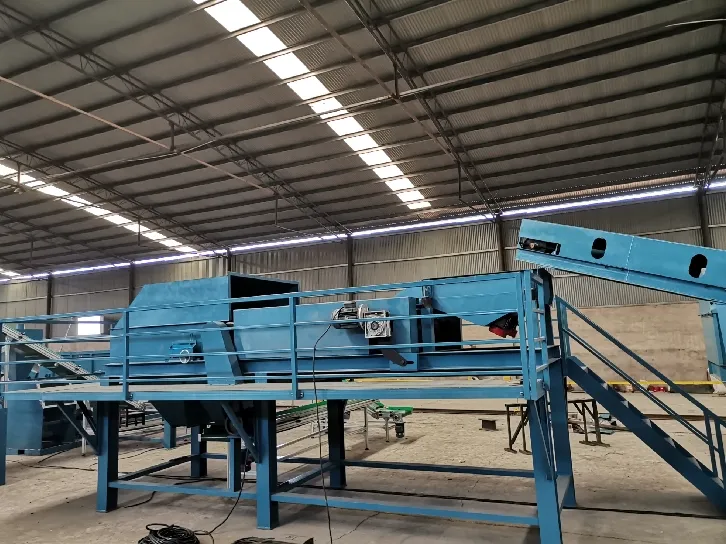

Nov . 16, 2024 06:39 Back to list
The Importance of Metal Recycling Plants
In today's rapidly evolving industrial landscape, the significance of sustainability has gained unprecedented attention. As the global population grows and the demand for metals continues to rise, the necessity for efficient metal recycling cannot be overstated. This is where metal recycling plant manufacturers come into play, playing a pivotal role in establishing infrastructure that promotes environmental sustainability while also supporting the economy.
The Role of Metal Recycling Plants
Metal recycling plants are specialized facilities designed to process scrap metal, transforming it into reusable materials. These plants operate through a series of sophisticated processes that include collection, sorting, shredding, melting, and refining. By doing so, they not only reduce the burden on landfills but also conserve natural resources and energy. The environmental benefits alone are significant; recycling metals uses up to 95% less energy compared to mining and refining new metals.
Metal recycling plants deal with various types of metals, including ferrous (iron and steel) and non-ferrous (aluminum, copper, brass, etc.). Each metal requires different processing techniques, which means that a specialized recycling plant must be configured accordingly. This has led to an increase in demand for custom-built recycling plants from experienced manufacturers who understand the complexities of metal recycling.
Economic Viability
Investing in metal recycling infrastructure is not just an environmentally friendly choice; it is also economically viable. The recycled metal market has shown consistent growth, driven by both demand for raw materials and the increasing awareness of sustainability. Manufacturers of metal recycling plants offer solutions that help businesses tap into this lucrative market. By efficiently processing scrap metal, these plants can provide a steady supply of high-quality recycled metals to industries such as automotive, construction, and electronics, contributing to the circular economy.
Moreover, metal recycling plants create jobs, not only within the facilities themselves but also throughout the associated supply chain. From collection and transport to processing and distribution, the entire system bolsters the local economy by providing employment opportunities and encouraging sustainable practices among manufacturers and consumers alike.

Innovations in Recycling Technology
Advancements in technology have revolutionized the way metal recycling is conducted. Modern metal recycling plants utilize state-of-the-art machinery and automated systems to enhance efficiency and accuracy. Innovations such as sensor-based sorting systems ensure that metal types are correctly identified and separated, maximizing the purity of the recycled output.
Furthermore, manufacturers are increasingly incorporating green technologies that minimize carbon emissions and energy consumption during the recycling process. For example, the use of electric arc furnaces for melting scrap metal is becoming more prevalent, as they are less energy-intensive than traditional blast furnaces. By investing in cutting-edge technology, metal recycling plant manufacturers are not only improving the efficiency of the recycling process but also helping to mitigate the environmental impact of metal production.
Challenges Facing the Industry
Despite the obvious benefits, the metal recycling industry faces several challenges. Fluctuations in market prices for raw and recycled metals can affect profitability, making it difficult for some recycling plants to operate sustainably. Additionally, the growing complexity of waste materials necessitates constant innovation in processing methods. Manufacturers must remain agile, adapting to changing regulations and market demands while continuing to invest in technology and infrastructure.
Conclusion
In conclusion, metal recycling plant manufacturers play an essential role in promoting sustainability, economic growth, and technological advancement within the recycling industry. As the world shifts towards more eco-friendly practices, the need for efficient, technologically advanced recycling plants has never been greater. By supporting these initiatives, we can conserve our precious natural resources, create jobs, and contribute to a more sustainable future. In the face of increasing metal demand and environmental concerns, the establishment and enhancement of metal recycling plants is a critical step towards building a circular economy that benefits both people and the planet.
Latest news
Troubleshooting Common Eddy Separator Problems
NewsJul.04,2025
The Role of Metal Recycling Plants in Circular Economy
NewsJul.04,2025
The Impact of Recycling Line Pickers on Waste Management Costs
NewsJul.04,2025
Safety Features Every Metal Shredder Should Have
NewsJul.04,2025
How Industrial Shredders Improve Waste Management Systems
NewsJul.04,2025
How Cable Granulators Contribute to Sustainable Recycling
NewsJul.04,2025